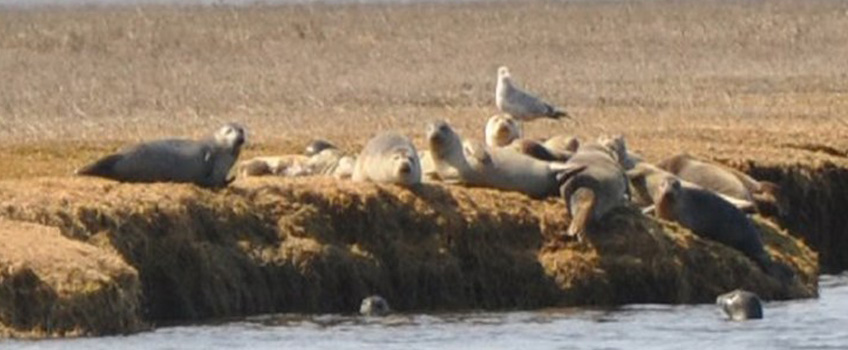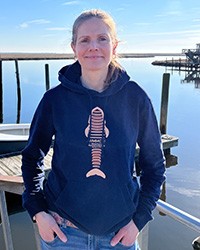Ocean Wind I Expands Partnership with Stockton

Galloway, NJ – New Jersey’s first offshore wind farm project, Ocean Wind 1, has announced an expanded partnership with Stockton University that supports the project’s monitoring and mitigation efforts related to the North Atlantic Right Whale and other marine wildlife.
Developed by Ørsted and PSEG, Ocean Wind 1 will be located off the coast of southern New Jersey. At 1,100 MW, Ocean Wind 1 will provide clean energy to 500,000 homes in New Jersey, support thousands of jobs and advance supply chain initiatives while helping the state meet its clean energy goals.
 Through the partnership, Ocean Wind 1 will support a first-of-its-kind program at
an accredited university and enable Stockton University to train individuals to be
Protected Species Observers (PSO). PSOs are certified professionals, approved by Bureau of Ocean Energy Management (BOEM)
and the National Marine Fisheries Service, who monitor for protected species, or for
those animals that are federally protected under the Endangered Species Act and/or Marine
Mammal Protection Act. PSOs are used by a wide variety of industries to help them
meet their regulatory compliance needs.
Through the partnership, Ocean Wind 1 will support a first-of-its-kind program at
an accredited university and enable Stockton University to train individuals to be
Protected Species Observers (PSO). PSOs are certified professionals, approved by Bureau of Ocean Energy Management (BOEM)
and the National Marine Fisheries Service, who monitor for protected species, or for
those animals that are federally protected under the Endangered Species Act and/or Marine
Mammal Protection Act. PSOs are used by a wide variety of industries to help them
meet their regulatory compliance needs.
“This collaboration with Ørsted and Ocean Wind will support important research at Stockton and prepare Stockton students to participate in the new clean energy economy while using their education and talents to protect the marine environment and the most vulnerable of its species,” said Dean of the School of Natural Sciences and Mathematics at Stockton University, Dr. Peter F. Straub.
Once certified, PSOs will be utilized by Ocean Wind 1 and other regional offshore wind farms during site investigations, construction, and operational activities to monitor, record and share sightings of North Atlantic Right Whales, for example, and other protected marine life as required by federal permits.
In addition to the PSO program, Ocean Wind 1 will also provide funding that will enable Stockton University to study the habitat usage of harbor seals in southern New Jersey. Harbor seals, which can be found on the East Coast from the Canadian Arctic to the Mid-Atlantic, are susceptible to habitat loss and degradation. This multi-year project will enable researchers at Stockton to remotely monitor harbor seal population patterns and food habits through 2024 and supports larger collaborative projects underway regionally with the Atlantic Marine Conservation Society, which is funded by Ørsted and Eversource’s Sunrise Wind project, the US Navy, and the Northeast Fisheries Science Center.
“We are proud to support these innovative programs at Stockton University,” said Laura Morse, Ørsted Marine Mammal specialist. “Not only will they result in valuable data on the marine mammals and wildlife in and around our Ocean Wind 1 lease area, but they will also help to further protect and conserve the North Atlantic Right Whale, harbor seals and other protected species along the coast of New Jersey with whom we coexist.”
This is not the first time Stockton University and Ørsted have come together. In 2019, Ørsted and Stockton signed a Memorandum of Understanding that allowed the company to support research and academic programs related to alternative energy, climate change and resiliency, and in turn, receive academic study and research to assist with the development, construction, operation, and maintenance of Ocean Wind 1.
Stockton University offers degree programs in environmental science, coastal zone management, geology, marine science, sustainability, and biological sciences that encompass study in marine biology and oceanography through field and laboratory courses, seminars, independent studies, internships, and research opportunities. The university also has a dedicated Marine Field Station that supports academic study and research of New Jersey coastal areas.
Adjunct Professor Jacalyn Toth Sullivan, a noted marine mammal specialist with Stockton, is leading the development of the PSO program as well as the Harbor Seal Studies with the support of Steve Evert, director of the Stockton Marine Field Station, and Stockton Marine Field Station crew.
“Both of these initiatives fill important needs as New Jersey moves forward with offshore wind energy development. Efforts to understand the population dynamics of these harbor seals, along with the establishment of a local Protected Species Observer Course is a step in the right direction for the conservation of New Jersey’s marine mammals,” said Toth Sullivan.
# # #
Media contact:
Diane D’Amico
Director of News and Media Relations
Galloway, NJ 08205
Diane.DAmico@stockton.edu
609-652-4593
609-412-8069
stockton.edu/media


